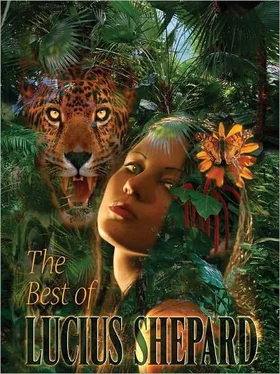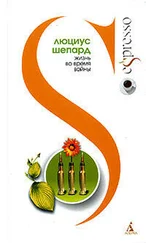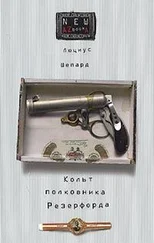“To get back to your question, I’ll try to do better than a blank stare, but I can’t give you a simple Yes or No. The matter can’t be summed up that neatly. But I can illustrate the situation by telling you a story and let you draw your own conclusions. There are hundreds of stories that would do, but the one that comes to mind now concerns the Lost Patrol…”
A Prowler tune blasted from the jukebox, and Mingolla broke off writing to listen: it was a furious, jittery music, fueled—it seemed—by the same aggressive paranoia that had generated the war. People shoved back chairs, overturned tables and began dancing in the vacated spaces; they were crammed together, able to do no more than shuffle in rhythm, but their tread set the light bulbs jiggling at the end of their cords, the purple glare slopping over the walls. A slim acne-scarred whore came to dance in front of Mingolla, shaking her breasts, holding out her arms to him. Her face was corpse-pale in the unsteady light, her smile a dead leer. Trickling from one eye, like some exquisite secretion of death, was a black tear of sweat and mascara. Mingolla couldn’t be sure he was seeing her right. His left hand started trembling, and for a couple of seconds the entire scene lost its cohesiveness. Everything looked scattered, unrecognizable, embedded in a separate context from everything else: a welter of meaningless objects bobbing up and down on a tide of deranged music. Then somebody opened the door, admitting a wedge of sunlight, and the room settled back to normal. Scowling, the whore danced away. Mingolla breathed easier. The tremors in his hand subsided. He spotted Baylor near the door talking to a scruffy Guatemalan guy… probably a coke connection. Coke was Baylor’s panacea, his remedy for fear and desperation. He always returned from r&r bleary-eyed and prone to nosebleeds, boasting about the great dope he’d scored. Pleased that he was following routine, Mingolla went back to his letter.
“…Remember me telling you that the Green Berets took drugs to make them better fighters? Most everyone calls the drugs ‘Sammy,’ which is short for ‘samurai.’ They come in ampule form, and when you pop them under your nose, for the next thirty minutes or so you feel like a cross between a Medal-of-Honor winner and superman. The trouble is that a lot of Berets overdo them and flip out. They sell them on the black market, too, and some guys use them for sport. They take the ampules and fight each other in pits… like human cockfights.
“Anyway, about two years ago a patrol of Berets went on patrol up in Fire Zone Emerald, not far from my base, and they didn’t come back. They were listed MIA. A month or so after they’d disappeared, somebody started ripping off ampules from various dispensaries. At first the crimes were chalked up to guerrillas, but then a doctor caught sight of the robbers and said they were Americans. They were wearing rotted fatigues, acting nuts. An artist did a sketch of their leader according to the doctor’s description, and it turned out to be a dead ringer for the sergeant of that missing patrol. After that they were sighted all over the place. Some of the sightings were obviously false, but others sounded like the real thing. They were said to have shot down a couple of our choppers and to have knocked over a supply column near Zacapas.
“I’d never put much stock in the story, to tell you the truth, but about four months ago this infantryman came walking out of the jungle and reported to the firebase. He claimed he’d been captured by the Lost Patrol, and when I heard his story, I believed him. He said they had told him that they weren’t Americans anymore but citizens of the jungle. They lived like animals, sleeping under palm fronds, popping the ampules night and day. They were crazy, but they’d become geniuses at survival. They knew everything about the jungle. When the weather was going to change, what animals were near. And they had this weird religion based on the beams of light that would shine down through the canopy. They’d sit under those beams, like saints being blessed by God, and rave about the purity of the light, the joys of killing, and the new world they were going to build.
“So that’s what occurs to me when you ask your questions, mom and dad. The Lost Patrol. I’m not attempting to be circumspect in order to make a point about the horrors of war. Not at all. When I think about the Lost Patrol I’m not thinking about how sad and crazy they are. I’m wondering what it is they see in that light, wondering if it might be of help to me. And maybe therein lies your answer…”
It was coming on sunset by the time Mingolla left the bar to begin the second part of his ritual, to wander innocent as a tourist through the native quarter, partaking of whatever fell to hand, maybe having dinner with a Guatemalan family, or buddying up with a soldier from another outfit and going to church, or hanging out with some young guys who’d ask him about America. He had done each of these things on previous r&rs, and his pretense of innocence always amused him. If he were to follow his inner directives, he would burn out the horrors of the firebase with whores and drugs; but on that first r&r—stunned by the experience of combat and needing solitude—a protracted walk had been his course of action, and he was committed not only to repeating it but also to recapturing his dazed mental set: it would not do to half-ass the ritual. In this instance, given recent events at the Ant Farm, he did not have to work very hard to achieve confusion.
The Rio Duke was a wide blue river, heaving with a light chop. Thick jungle hedged its banks, and yellowish reed beds grew out from both shores. At the spot where the gravel road ended was a concrete pier, and moored to it a barge that served as a ferry; it was already loaded with its full complement of vehicles—two trucks—and carried about thirty pedestrians. Mingolla boarded and stood in the stern beside three infantrymen who were still wearing their combat suits and helmets, holding double-barreled rifles that were connected by flexible tubing to backpack computers; through their smoked faceplates he could see green reflections from the readouts on their visor displays. They made him uneasy, reminding him of the two pilots, and he felt better after they had removed their helmets and proved to have normal human faces. Spanning a third of the way across the river was a sweeping curve of white cement supported by slender columns, like a piece fallen out of a Dali landscape: a bridge upon which construction had been halted. Mingolla had noticed it from the air just before landing and hadn’t thought much about it; but now the sight took him by storm. It seemed less an unfinished bridge than a monument to some exalted ideal, more beautiful than any finished bridge could be. And as he stood rapt, with the ferry’s oily smoke farting out around him, he sensed there was an analogue of that beautiful curving shape inside him, that he, too, was a road ending in mid-air. It gave him confidence to associate himself with such loftiness and purity, and for a moment he let himself believe that he also might have—as the upward-angled terminus of the bridge implied—a point of completion lying far beyond the one anticipated by the architects of his fate.
On the west bank past the town the gravel road was lined with stalls: skeletal frameworks of brushwood poles roofed with palm thatch. Children chased in and out among them, pretending to aim and fire at each other with stalks of sugar cane. But hardly any soldiers were in evidence. The crowds that moved along the road were composed mostly of Indians: young couples too shy to hold hands; old men who looked lost and poked litter with their canes; dumpy matrons who made outraged faces at the high prices; shoeless farmers who kept their backs ramrod-straight and wore grave expressions and carried their money knotted in handkerchiefs. At one of the stalls Mingolla bought a sandwich and a Coca Cola. He sat on a stool and ate contentedly, relishing the hot bread and the spicy fish cooked inside it, watching the passing parade. Gray clouds were bulking up and moving in from the south, from the Caribbean; now and then a flight of XL-16s would arrow northward toward the oil fields beyond Lake Ixtabal, where the fighting was very bad. Twilight fell. The lights of the town began to be picked out sharply against the empurpling air. Guitars were plucked, hoarse voices sang, the crowds thinned. Mingolla ordered another sandwich and Coke. He leaned back, sipped and chewed, steeping himself in the good magic of the land, the sweetness of the moment. Beside the sandwich stall, four old women were squatting by a cooking fire, preparing chicken stew and corn fritters; scraps of black ash drifted up from the flames, and as twilight deepened, it seemed these scraps were the pieces of a jigsaw puzzle that were fitting together overhead into the image of a starless night.
Читать дальше






